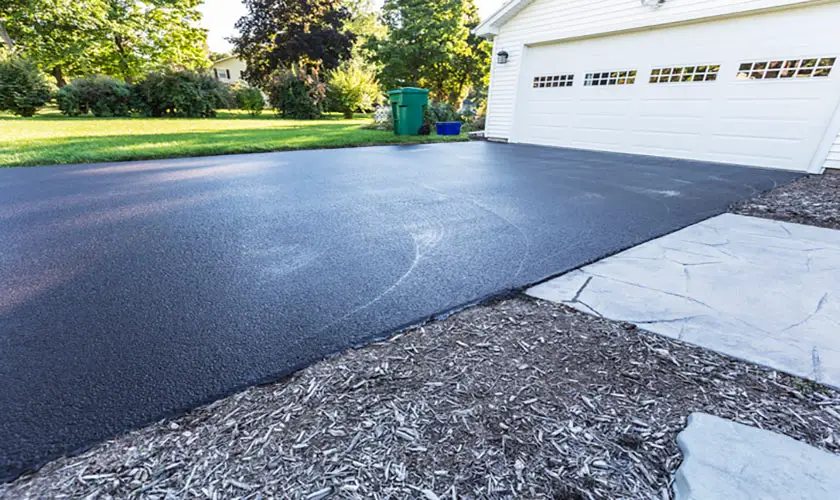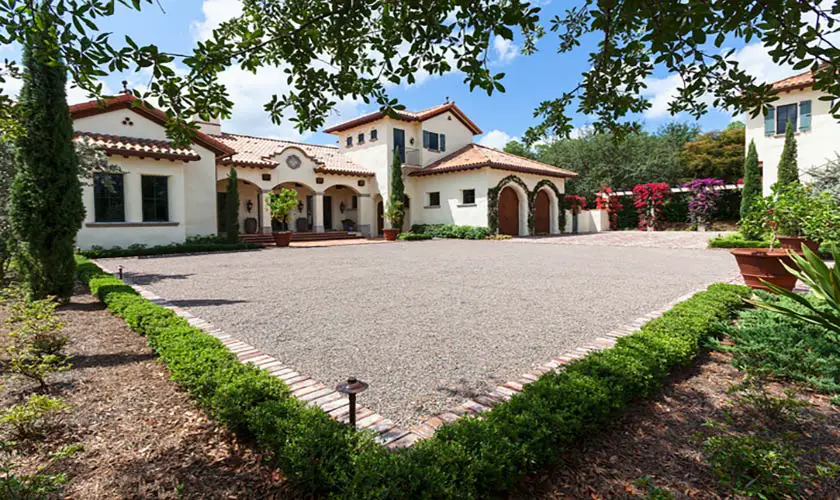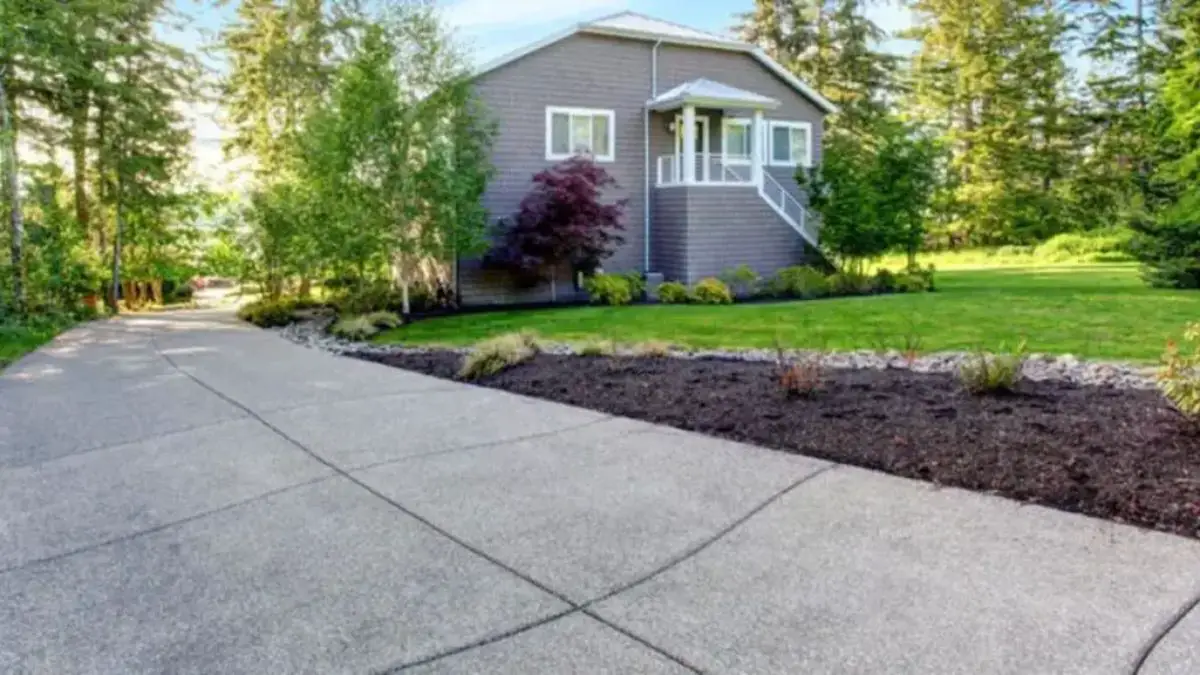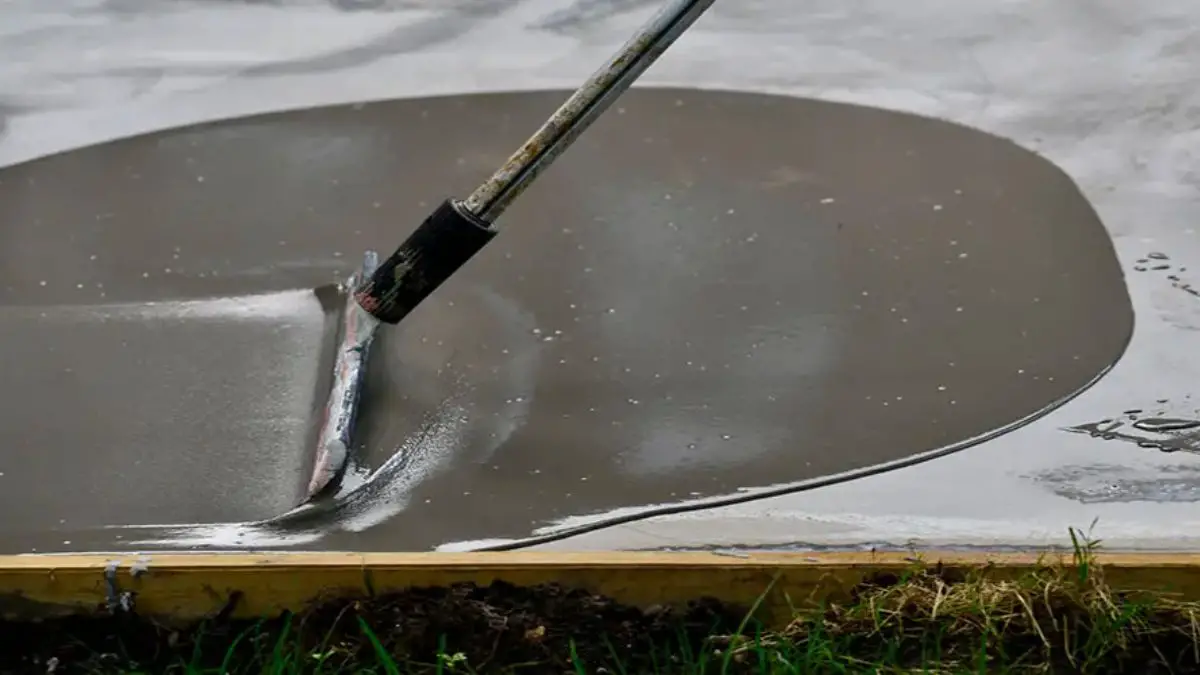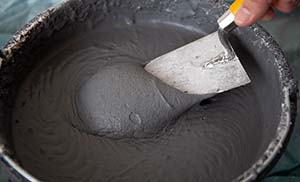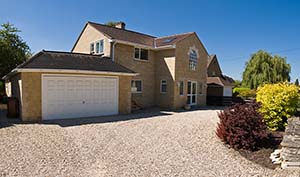What’s the ideal aesthetic when you think of your home? Do you picture a long, clear driveway leading to the house? Does lush, well-kept greenery flank the driveway? Homeowners still use driveways to enhance the look of their homes. They can choose between a concrete or asphalt driveway.
People often choose concrete for driveways because it is sturdy and lasts longer than asphalt. Asphalt driveways are cheaper and have benefits, especially for long driveways that need paving.
Asphalt vs. concrete costs depend on where, how big, and how much maintenance. Asphalt is cheaper initially, but concrete lasts longer and needs less upkeep. It’s important to consider all the specific factors to find the best choice.
Summary of Differences Between Asphalt and Concrete
| Concrete | Asphalt | |
|---|---|---|
| Installation Time | Seven days to be drive-ready and 30-45 to fully cure | 1-3 days to drive ready, up to 30 days to cure fully |
| Installation Cost | $5-$13 per square foot, including $3 to $11 for materials depending on the mixture PSI | $7 to $13 for a new installation, including $2 to $6 per square foot for materials |
| Care & Maintenance | Concrete can crack and shift from tree roots and heavy vehicles. As a result, patching damaged areas can prove challenging. | Requires resurfacing every five years to maintain a smooth driving surface. Asphalt needs to be sealed every 2-3 years. |
| Durability | It can last 40 or more years. Commercial-grade 5″ poured concrete can last up to 80 years or more. | It can last up to 25 years. Requires resurfacing and routine sealing to maximize the useful life. |
| Performance in Extreme Weather | Due to its hardness, concrete can be susceptible to freezing weather. It can require additional support in colder climates. | Asphalt is softer and can withstand temperature fluctuations. Asphalt can withstand more ground movement. |
| Aesthetics | Concrete can be colored, etched, stamped, or resin reinforcement. | Asphalt is black and has limited aesthetics other than lighting. |
| Resale Value | Concrete carries a higher resale valve. | Asphalt has a lesser resale valve. |
| Environmental Consciousness | Concrete is more environmentally conscious because of its longevity. | Although recycled, asphalt production has a higher carbon footprint than concrete over its lifespan. |
You’re in the right place if you ask yourself what’s better between a concrete driveway and an asphalt driveway. We’ll compare the good and the bad bits about each option using different angles to help you choose or make the switch.
Every homeowner dreams of installing solutions that last a long time and still look good.
Concrete lasts longer than asphalt. A concrete driveway has stronger support underneath to handle a heavier load. You’re looking at 20 to 30 years with proper care.
Concrete vs. Asphalt Installation Time
When you start the driveway project, you will limit the main entrance. The installation must be quick and still have excellent structural quality. Installing a new concrete driveway can take between 1 to 3 days.
Depending on the weather and the ground layout, you should have a dry top layer in six hours. The time is enough for light foot traffic. It will take up to seven days to cure enough to drive over the concrete. And even then, keep the load light.
Concrete hardens over time. Allow between 30 to 45 days before driving heavier vehicles such as RVs.
Preparing for an asphalt driveway can be a lot of work if you need to remove tree stumps and level the ground. Still, once we clear the site, we can lay the driveway and have it ready in less than an hour. Asphalt takes less than 72 hours to be safe for vehicle load and foot traffic.
Like concrete, giving the asphalt enough time to cure is important. Wait for up to 30 days before driving heavy vehicles on it.
Rating for installation time: asphalt is better than concrete.
Concrete vs. Asphalt Cost to Install
Affordability is important when the project starts and for maintenance costs later on. Do you want to save money in the long run or spend less right now?
The cost to compare an asphalt driveway and a concrete one depends on location, size, and materials. An asphalt driveway is cheaper upfront. It costs $2 to $5 per square foot. In comparison, concrete costs $4 to $15 per square foot. Concrete lasts longer and needs less upkeep, so it may be a cheaper choice over time.
A standard asphalt driveway installation costs$7-$13 per square foot. If you’re working with the typical 600-square-foot driveway fit for two cars, that’s up to $4,200 to $7,800. Adding decorative elements like colored lighting can increase your bill to around $15 per square foot or higher.
A standard concrete driveway costs between $5 to $13 per square foot, including labor. For 600 square feet, you’re looking at between $3000 and $7800 for the basic package. You can include color options where you should expect to spend up to $ 10,000.
Both are solid investments in price, but asphalt is better for your pockets at first.
The front area is very important when you begin a home-building project or are looking for a house. Often, this front area includes a driveway. But did you know that a driveway can increase a home’s value? Still, improving your home’s visual appeal and raising its value comes at a cost.
Concrete and asphalt are superb options to consider for your driveway.
Asphalt driveways have recently approached nearly even concrete upfront costs. Asphalt costs $8 to $20 per square foot, while concrete costs $6 to $15 per square foot, depending on the strength of the installation. Concrete is a higher-value long-term option since it lasts up to 40 years or more with proper maintenance.
The near-even costs have much to do with the machinery needed for asphalt paving. Asphalt is generally cheaper than concrete if paving large areas like parking lots.
You’ll only need a concrete truck to mix and pour the concrete when pouring concrete. Concrete is spread and leveled by hand to be more labor-intensive.
Let’s crunch the numbers on which costs less, asphalt or concrete driveway.
| Asphalt Cost Per Square Foot | Concrete Cost Per Square Foot | |
|---|---|---|
| Material | $2 to $5 | $3 to $5 |
| Gravel/Grading | $1 to $2 | $1 to $2 |
| Labor | $5 to $13 | $2 to $8 |
| Total: | $8 to $20 | $6 to $15 |
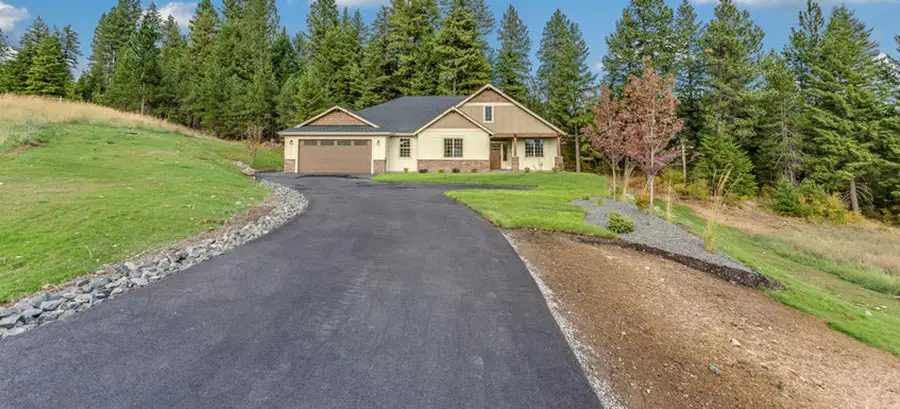
New Asphalt Driveway Cost
Asphalt is an easy choice for homeowners. It’s neutral and gives an average home a clean, sophisticated look.
| Asphalt Paving | Cost Per Square Foot Homeadvisor.com | Cost Per Square Foot Fixr.com |
|---|---|---|
| Asphalt Material | $2 to $5 | $1 to $5 |
| Gravel Base | $0.50 to $1 | $2 |
| Installation | $5 to $7 | $4 to $13 |
| Total: | $7 to $13 | $7 to $15 |
The average initial cost of a new 600sf asphalt driveway is $2900 to $6600. The average cost of an asphalt driveway in the US is $4758. This price varies depending on location and labor.
In some places, the cost is very low, about $1500. But in fancy areas, it can be as high as $11000.
Using asphalt for your new house or driveway will cost $7 to $13 per square foot.
A single-car driveway is about 9-12 feet wide. A 2-car driveway measures approximately 20-24 feet wide. You’ll need a driveway of around 600 square feet to have enough space for one or two cars. A 600-square-foot asphalt driveway will cost at least $4000 in material alone.
Here, we’re talking about the following material:
- The granular base of gravel, sand, and crushed rock ($0.50-$1 per square foot of gravel for the base)
- Tar
- Asphalt material
$4200 gives you a comfortable range to have a budget for add-ons.
It would help if you bought asphalt by the ton, as that is the standard set by most asphalt dealers. One ton of asphalt covers 40-80 square feet:
- 2-inches thick: 80 square feet per ton – Standard for walking paths, golf carts, etc.
- 4-inches thick: 40 square feet per ton – Recommended for cars and trucks.
- 6-inches thick: 20 square feet per ton – Recommended for heavier vehicles like RVs.
To have a 1200-square-foot driveway laid, you’ll need 15 tons of asphalt at between $100 to $200 per ton. Note that the $100-$200 range is for hot mix asphalt, which is the best for new installation. You can use cold mix asphalt to fix potholes and small repairs. It costs $10-$50 per bag, which is much cheaper.
The average driveway will require 7.5 to 15 tons of asphalt material.
In the past, designers cut and dried asphalt driveways. There wasn’t much room for added appeal. All you had to go with was a black surface. But, of course, that kept prices at a steady rate.
You can fix your old concrete driveway by adding a layer of asphalt. It costs $3 to $7 per square foot. Make sure to check and take care of this application often. The concrete underneath can damage the asphalt surface.
Currently, you can have improved finishing. Improved finishing on asphalt includes
- Decorative stamping
- Tinting using colored rocks and recycled glass
- Special paint sealer for different colors
You will need to pay more for the new material and expertise to install the post-installation features on top of the original cost. Let’s give it a rough estimate of $15 a square foot, depending on the professional labor and location.
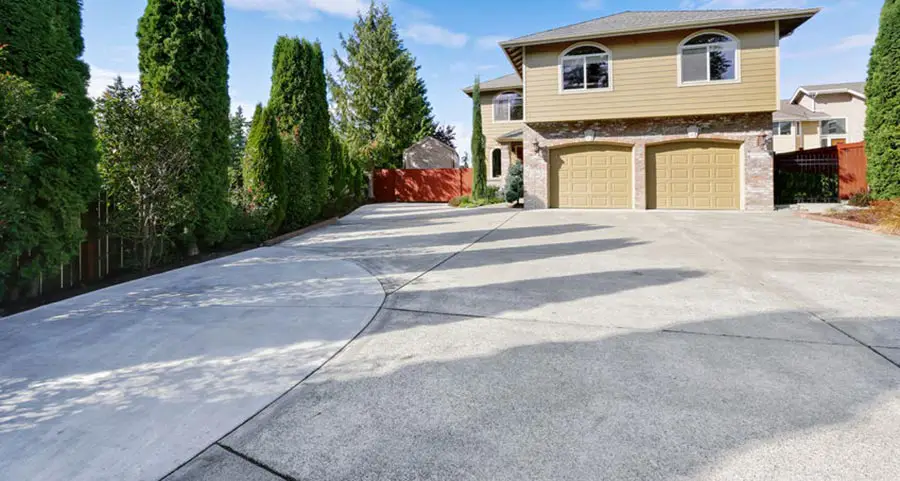
New Concrete Driveway Cost
| Concrete Paving | Cost Per Square Foot Homeadvisor.com | Cost Per Square Foot Fixr.com |
|---|---|---|
| Poured Concrete | $3 to $4 | $3 to $5 |
| Grading/Prep | $1 to $2 | $1 to $2 |
| Installation | $2 to $3 | $4 to $8 |
| Total: | $6 to $9 | $8 to $15 |
Prices are estimates and will vary by location. Prices exclude specialty designs and finishes.
Some neighborhoods require homeowners to install only concrete driveways. People use sand, water, cement, and aggregates to strengthen driveways. You have plenty of customization options compared to asphalt.
On average, a new concrete driveway has a higher initial cost, from $1800 to $6000. Larger driveways can cost well over $10,000.
You can opt for DIY, where you’ll spend only on the material. A new concrete driveway can cost up to $3 to $4 per square foot. That means it could cost around $1800 to $2400 for a driveway that is 600 square feet.
We can categorize concrete driveways into three categories: basic, midrange, and high-end. The pricing depends on location and material. The basic category includes a border, one color, and a regular texture finish. It costs $8-$12 per square foot.
Concrete driveways in the middle price range can cost up to $18 per square foot. You can also choose paving, stamping, coloring, or staining options. If you want to impress, prepare to spend around $20 per square foot for a unique concrete driveway.
The price of a concrete driveway can change based on its size, location, and labor expenses. On average, homeowners can expect to pay between $4 to $10 per square foot for a concrete driveway. Additional factors like decorative finishes or staining can increase the cost. It’s recommended to get multiple quotes from different contractors to compare prices.
| Service/material | Cost |
|---|---|
| Permit | Up to $200, depending on the state |
| Labor | $4-$15 per square foot |
| Stamping the driveway | $2.50-$4 per square foot |
| Pigment | Up to $2 per square foot |
The standard concrete driveway is about 4 inches. However, if you intend to have heavier cars on your driveway, such as an RV, you want to increase inches to between 5 and 7 inches. An increase per inch costs about 20% more.
Let’s break down the numbers behind installing a concrete driveway.
From excavation, you will spend up to $5 to clear the area per square foot of the site. Here, you can go DIY. To improve the site for sub-base and drainage, prepare it by adding around $8 per square foot level to the ground.
Rebar reinforcement depends on the thickness and the steel grade used. You do not want to skimp on rebar. It’ll save you maintenance costs when you deal with cracks. $1.40 to $3 per square foot is a fair price for added durability.
Note that these prices are for a typical rectangular driveway. A circular concrete driveway can cost up to $20 per square foot or at least 15% of a rectangular concrete driveway. A circular driveway must be at least 15 feet wide.
You may need to hire professionals to install extra features like curbside drainage and decorative finishing. For example, colored stains and patterns can drive your costs upwards of $15 per square foot.
If you add borders to your driveway, you’ll add between $13 to $30 per square foot. To finish your driveway, you can opt for exposed aggregate or pebbles. Your costs are $1-$3 per square foot region. You’ll need more sealant to finish it off and improve the home’s appeal.
Sealing costs $0.75 per square foot. Sealing is supposed to make your driveway last longer. Still, it doesn’t mean the driveway won’t take some damage. After a while, you will need to renovate your driveway. If you live in a cold climate, set aside a repair budget, as the cold weather is not particularly friendly to concrete.
Extra Features on Asphalt and Concrete Driveways
A basic driveway is okay. Still, some homeowners want to raise the resale value even higher. And the driveway is a great place to make a lasting impression with extras. These extras are not just for boosting your home’s value. They also help to lengthen the driveway’s durability.
Heating
Snow and cold weather affect asphalt and concrete driveways. Installing a heating system under the driveway costs about $28 per square foot. Costs can be as low as $12, though. In addition to spending anything between $9000 to $16000 on heating, you will also incur between $120 to $600 in operating costs.
Heating systems cost less for concrete than asphalt, with concrete capable of going to $8000.
Drainage
Water retention under the driveway causes pressure build-up and causes warping and cracking later. A drainage system is designed to slope away into the main street. A proper drainage system reduces your post-installation maintenance cost over time.
A new drainage costs between $1000 to $4000. Using porous asphalt gives your driveway better drainage capability at $8 to $15 per square foot. It could save you some expenses in grading and leveling, too.
Factors to Consider When Comparing Costs of Asphalt and Concrete Driveways
- Material availability: Concrete and asphalt are easy to find. It gives the contractor an easier time to source materials and find well-equipped professionals to handle them. It costs you less time and money to work with readily available material.
- The scale of work: The rates covered here are estimates for a 2-car driveway. Project size is a key factor in cost estimation for your driveway project.
- Water retention of the surrounding: The driveway also clears rainwater because it retains water from the surrounding area. By considering drainage during pre-planning, you can prevent unnecessary driveway re-installation expenses.
- Extra properties: Adding decorative elements like plants, lights, and heaters will cost you extra. Before you start installing additions, it’s helpful to have a plan. During pre-planning, we can draw out this plan. It will serve as a reference point for cost estimates and materials in the future.
How to get the Best Rates to Install a Concrete or Asphalt Driveway?
The best time to get a home improvement contractor for a driveway is during the fall. Winter and summer are on temperature extremes. You might have to pay more for a new driveway if it has damage.
How to Extend the Lifespan of a Newly Installed Driveway?
Load affects how long your driveway lasts. You can install a gate that limits access to your driveway. Installing a gate costs you about $7000.
Contact a professional contractor for a quote to handle your project to completion. The contractor advises you on what’s better between concrete and asphalt and recommends based on your budget and long-term goals.
Concrete vs. Asphalt Driveway Care and Maintenance
Proper maintenance ensures your driveway looks good and saves you repair costs on possible car damages. A damaged driveway can be dangerous for your tires.
Asphalt Repair and Resurface Cost
Asphalt driveways develop cracks, especially if you live in cold climates. So you’re looking at resurfacing and resealing every three to five years. Also, you must reseal with a new sealant coat six months after the installation.
How does that affect your costs?
Surfacing an asphalt driveway costs $3-$7 per square foot. So, working with our 600-square-foot average, you will need between $1800 to $2400. Still, the national average is about $3000.
Asphalt will develop cracks during its supposed 15 to 20-year stint. It’ll cost you $0.50 to $3.00 per linear foot to repair cracks in your driveway, assuming the driveway has no potholes.
Repair costs can shoot up to $12 per linear foot, excluding service fees. Service fees will likely increase your tab by over $250 per square foot.
Be prepared to spend $100-$400 to fix potholes by keeping money in your wallet. The cost depends on the damage and how it’s repaired. Pothole patching at about $25 to $40 per hole. Add to this between 100-$250 for the labor and machinery.
Finally, you’ll need a sealer for the finishing touch. The sealer will cost you $18 to $32 for a 10-gallon pail covering 600 square feet.
An asphalt driveway requires a new coating every two to five years. The coating gives your driveway that crisp black shine that keeps it appealing. It also helps the driveway resist water, so you don’t have to fix it often.
You can buy recycled tar for asphalt driveway maintenance. Recycled asphalt is an affordable option for sealing asphalt cracks and resurfacing. You can clean your asphalt driveway yourself every two years or when it looks dirty.
Dealing with oil stains on a concrete driveway meant for cars can be challenging. Still, concrete is easier to maintain in the short term. A well-done foundation incurs less damage over time.
Concrete Driveway Repair Cost
Renovating a concrete driveway involves removing the initial driveway. There are several instances where renovation and repair will need DIY, or you’ll need a professional.
| Damage | Course of action | DIY/Professional | Cost |
|---|---|---|---|
| Minor cracks and holes a ¼” wide or less | Filling | DIY | $0.37 in material |
| Large cracks over ¼” wide | Resurface | DIY or Professional | Material + $30 per hour for labor |
| Spalling | Patching | Professional | $4-$7 per square foot or up to $85 per hour |
| Scaling | Concrete curing | Professional | Up to $5 per square foot |
| Discoloration | Recoloration | Professional | 32c per square foot |
| Sinking | Mudjacking/Slabjacking | Professional | Depending on size, $300-$2500 for the entire driveway |
| Structural damage | Full replacement | Professional | Up to $24 per square foot |
Renovating a concrete driveway involves removing the initial driveway. Sometimes you’ll need to do renovations or repairs yourself, but other times you’ll need a professional.
Let’s assume you have a 600-square-foot driveway. Demolition and debris clearance will cost you $1-$3 per square foot. Depending on your location, removal and clearance costs can go up to $5.
You won’t have to demolish the entire driveway, though. If the damage is bad, the concrete repairs will only cover up to where it ends and a small area around it for uniformity. Over time, the driveway may start to look a bit different. If you want to make it look new again, you might need to save money for a complete renovation.
Remember the rebar that you included in your initial installation? You should consider evaluating whether you need rebar or mesh. Rebar also comes at a greater cost than mesh during repairs.
Pressure washing is enough to keep a concrete driveway looking good. If the concrete driveway sustains noticeable damage, for example, huge cracks, a simple patch fix won’t do. You must remove and repour all or part of the concrete driveway.
Considering concrete cracks during winter, it needs more maintenance than asphalt. You can use an expandable concrete crack filler to repair cracks, provided the concrete has not heaved.
On the frequency of maintenance, it is easier to deal with asphalt over time. Thus, asphalt is better than concrete if you want a low-maintenance driveway.
Concrete vs. Asphalt Driveway Durability
Durability is crucial for installing a concrete driveway or an asphalt driveway. A well-kept asphalt driveway can last around 25 years in a quiet area with few repairs. More than weather and stains can affect concrete. It is also vulnerable to heavy vehicles. Still, concrete can last up to 40 years with proper care.
But what does it take to last that long with each driveway material?
Asphalt is less likely to get oil stains. It absorbs some oil spills since asphalt is already a petroleum product. You won’t need harsh cleaning products to get rid of spills from the car. Asphalt can stretch and shrink more without getting damaged because it’s soft.
Concrete is at the mercy of ice during winter, oil spills, paints, and heavy loads. To keep your concrete driveway in good condition, use a power washer, fix small cracks, and clean up spills.
Concrete is a more durable surface and lasts much longer than asphalt.
Concrete vs. Asphalt Driveway: How They Perform in Extreme Weather
Your driveway gets tested by two extreme weather conditions: scorching heat and freezing cold. Summer is okay for concrete. Sure, the concrete driveway expands and contracts in heat. But most well-constructed driveways have the structural support to withstand such pressure.
To keep a concrete driveway dry, homeowners can apply a sealant to the surface. When the concrete survives a tough summer without cracking, they see the benefits of the sealant.
It is a different ball game during winter. Winter is harsh on concrete. Ice thaws out, seeps into the concrete, and creates pressure under the driveway.
In a short time, the concrete cracks. Not only does it cause it to crack, but deicing with salt can cause more damage to concrete driveways. Even solutions like blue deicing salt can stain the concrete.
Winter also makes concrete heave upwards, creating an unnatural shape. Winter is a stressful time for a concrete driveway. The first winter after installing a new concrete driveway might be the hardest.
As discussed above, concrete takes a long time to cure. The base might not handle melting snow if you put it in a concrete driveway in winter. You might face added repair costs if you do not winter-proof your concrete driveway.
A good drainage system can protect your driveway from damage during winter.
If you live somewhere hot, remember that asphalt becomes very hot in the sun because it’s dark. A shaded asphalt driveway will stay cooler even in the summer months.
Even in a hot climate, concrete stays cooler because of its light color.
Concrete vs. Asphalt Driveway: Which Looks Better
Concrete and asphalt have excellent visual appeal, even in their simplicity. The standard driveway in a neutral color works in most areas.
The cost comparison of asphalt vs. concrete is dependent on various factors. Asphalt costs less but needs more maintenance and may need resurfacing later. Concrete costs more but lasts longer and needs less upkeep.
Asphalt is a black driveway that blends well with any exterior. The black asphalt surface makes the front or back area of your house look good. Some homeowners go a step further and improve their asphalt driveways.
They put in lights, decorative markings, and colors. The driveway is customized and makes the house’s outside look nicer and more valuable. The extra decor comes at additional costs.
The average cost of coloring an asphalt driveway ranges from $10 to $18. But you can dye only the topcoat and spend up to $10 per square foot.
Concrete has plenty of customization options. These include:
Coloring: Staining your concrete with contrasting colors to give your house and driveway a new look boosts the visual appeal of your home. It gives your home individuality while increasing the monetary value of the home.
Etching: etching takes personalization to a new level. You can etch names, patterns, and designs to your concrete driveway to give your home a unique identity. If you resell the house, the new owners would not have to spend too much on improvement unless the etched design was specific to you.
Resin reinforcement: resin reinforcement on a concrete driveway uses simple things such as glass in the concrete covered in resin. Decorative options give your driveway instant appeal and set it apart from other homes if you live in a controlled development area.
Stamping: lets you keep the same grey color but improves the look by including designs into the driveway. You can give the driveway the appearance of tiles or stones by stamping the concrete surface while it is still soft.
Concrete has more options than asphalt for aesthetics if you want to make a statement.

Concrete vs. Asphalt Driveway: Resale Values
A well-maintained driveway can increase the value of your home by up to $7000 or more. Having an asphalt driveway makes your home look connected to the street if you live near a road. A concrete driveway gives your home a unique sight.
The resale value here depends on how much you have spent improving the driveway. Adding features like decorative lights to your driveway will make it look amazing and easier to see.
The difference in resale value might be debatable. Some factors will tip the value of one element in favor of the other. See, a concrete driveway has a lifespan of up to 30 years. Buyers may spend more on a house with a concrete driveway because it’s less likely to get damaged than an asphalt driveway.
But if the buyer cares about the area’s appearance, they might prefer an asphalt driveway.
Concrete driveways raise home value more than asphalt because they last longer and can be customized.
Concrete vs. Asphalt Driveway: Environmental Consciousness
The eco-friendly approach must extend outside the driveway with homes switching to green energy.
Installing a new asphalt driveway requires hot mix asphalt. The environment is harmed by asphalt production, but it can be reused for repairs. To relay or repair an asphalt driveway, heat the asphalt to prepare it for use.
Reusing asphalt saves you the cost of new installation and reduces carbon emissions.
You can also use cold-mixed asphalt to fix cracks in the driveway. You will use a fraction of the repair costs, making it more environmentally friendly.
Also, you can use porous asphalt. Porous asphalt allows rainwater to flow under the driveway instead of pooling, returning to the water table.
Concrete lasts a long time — about 40 years with utmost care. With proper drainage structures in place, you don’t need to repair a concrete driveway as often. Don’t let heavy vehicles on your driveway to avoid damaging the support structure. Be careful!
We cannot sidestep that asphalt uses environmentally unsustainable resources despite being recyclable. Homeowners who care about the environment should choose a concrete driveway over an asphalt one.
Concrete vs. Asphalt: So Which is Better for a Driveway?
Decide what matters to you and find the right professional for your driveway. Get a licensed home inspector who’ll assess your home and help you make an informed choice.
Step outside and look at your home from an outsider’s point of view. The driveway hardly stands out. Yet, it will stick out like a sore thumb if it is in bad condition. Middle-income residential areas tend to have concrete or asphalt driveways.
This is because of two reasons.
A concrete or asphalt driveway is a clean, smooth space for you or your guests to park. Concrete and asphalt driveways can get damaged over time, especially with high traffic. They have a polished look and last a long time.
Also, it would help to have bargaining leverage when you want to put your home on the real estate market. Adding a concrete or asphalt driveway can help you negotiate better terms with incoming tenants.
Some areas have requirements for all the houses in the area. A driveway for each home is a way to control the area’s aesthetic appeal. To follow the regulations, you need one of these two options.
Both concrete and asphalt have their upsides. Depending on your priorities, either would be a great choice. It would help if you got the right people on the job to maximize the benefits of the driveway you choose.
Asphalt performs better in places with fluctuating weather conditions. Concrete has more customization options. If you plan to sell your home in the future, choose asphalt. It allows for more renovations.
Concrete vs. Asphalt Driveway FAQs
Is concrete or asphalt better for a driveway?
When selecting a driveway material, think about your budget, the climate, how it looks, and upkeep. Concrete is durable and customizable but costly. Asphalt is cheaper but needs more upkeep. Asphalt is better for cold climates; concrete suits hot areas.
Why do we use asphalt for roads instead of concrete?
Asphalt is popular for roads because it is affordable, installs quickly, and is flexible. It also reduces noise, is recyclable, provides a smooth ride, and can adapt well in winter. Despite a shorter lifespan, easy repair and versatility make it popular. The choice depends on budget, climate, and project requirements.
What are the pros and cons of asphalt driveways?
Asphalt driveways are fast to install, cost-effective, and adaptable to temperature changes. They melt snow quickly, have a smooth finish, require regular sealing, and are susceptible to damage and extreme heat.
What type of driveway lasts the longest?
Driveway lifespans vary: concrete (30-50 yrs), asphalt (12-20 yrs), gravel (indefinite with upkeep). Factors like installation quality, climate, and maintenance impact longevity. Concrete is durable but expensive. Asphalt is cheaper but requires maintenance. Gravel is affordable but requires refilling.
Conclusion
Consider installation time, cost, and maintenance when deciding between a concrete or asphalt driveway. Also, consider durability, extreme weather performance, aesthetics, resale value, and environmental impact.
When deciding on a driveway material, homeowners should consider their needs, budget, preferences, and climate. Both materials have advantages and disadvantages.
The best choice depends on what factors are most important to each person. To find the best option, talk to a professional contractor who knows your situation and area.


